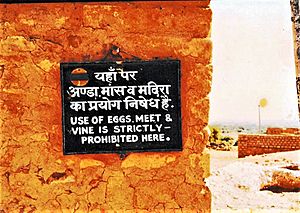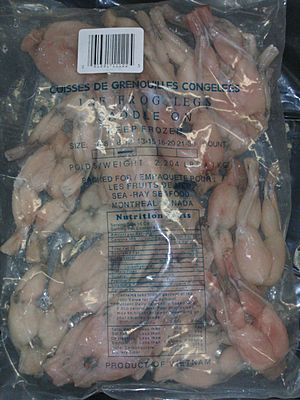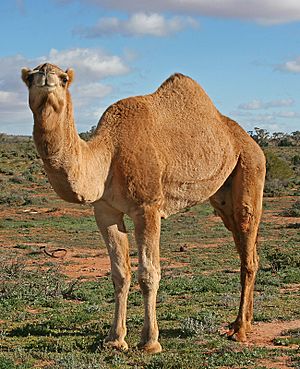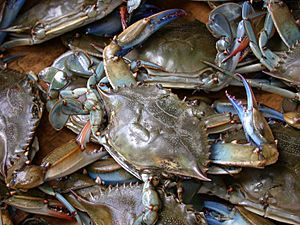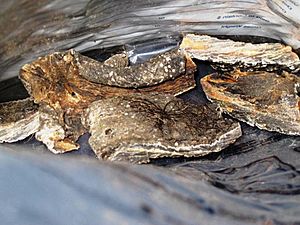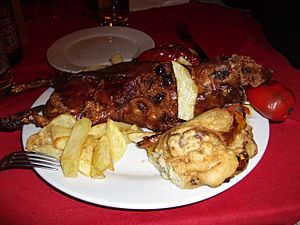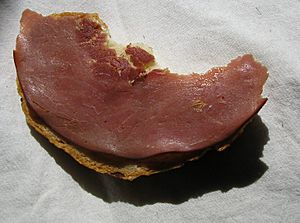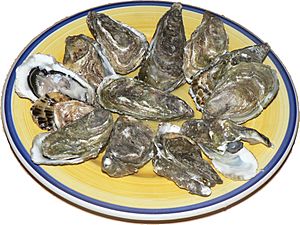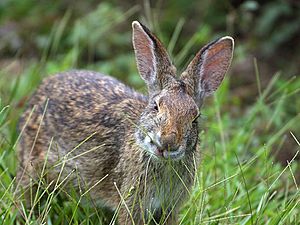Food and drink prohibitions facts for kids
Some people choose not to eat certain foods or drinks. This can be because of their religion, culture, or even law. Often, these rules are called taboos. Many food taboos stop people from eating certain animals, like mammals, fish, or insects. Sometimes, it's just a specific part of an animal that is forbidden. Other times, it's about not eating certain plants or mushrooms.
Food taboos can be rules set by a religion or other groups. They explain which foods cannot be eaten, or how animals must be prepared. These rules have many different reasons. Some might be for health, while others are linked to special meanings or beliefs.
Some foods might be forbidden only at certain times, like during a religious holiday (for example, Lent). They might also be forbidden for certain people, like pregnant women or priests. What one group cannot eat, another group might enjoy. Food taboos often aim to protect people, either spiritually or physically. Many also have reasons linked to health or the environment. For example, a taboo might help a community use its food resources wisely. Food taboos can also help a group feel connected and keep its unique identity.
Contents
- Why Do Food Taboos Exist?
- Forbidden Foods
- Amphibians
- Bats
- Bears
- Birds
- Camels
- Cats
- Cattle
- Chewing Gum
- Crustaceans and Other Seafood
- Dairy Products
- Dogs
- Eggs
- Elephants
- Fish
- Fungi
- Guinea Pig and Related Rodents
- Herbs
- Horses and Other Equines
- Insects
- Kangaroo
- Living Animals
- Primates (Apes, Monkeys, etc.)
- Offal
- Pigs/Pork
- Poppy Seed
- Rabbit
- Rats and Mice
- Reptiles
- Vegetables, Fruits, and Spices
- Whales
- Forbidden Drinks
- Forbidden Combinations
- See also
Why Do Food Taboos Exist?
Different religions have rules about what their followers can eat. For example, Judaism has strict rules called Kashrut. These rules say what foods are allowed and, importantly, that meat and dairy products cannot be mixed. Islam has similar rules, dividing foods into haram (forbidden) and halal (allowed).
Jains often follow religious rules to be vegetarian. Most Hindus do not eat beef. Some Hindus also believe in ahimsa (non-violence) and choose to be vegetarian. Sometimes, it's not the food itself, but how it's prepared that matters. For instance, in early Christianity, there were questions about eating uncooked foods. The Kapu system in Hawaii also had food rules until 1819.
Beyond formal rules, cultures also have their own taboos. Some meats might be seen as "not food" in a certain society. New or unusual meats can often make people feel disgusted. This feeling can turn into a cultural taboo. For example, dog meat is eaten in some parts of Korea, Vietnam, and China. But in most Western countries, eating dog meat is seen as wrong. Similarly, horse meat is rarely eaten in English-speaking countries. However, it is a common food in places like Kazakhstan, Japan, Italy, and France.
Sometimes, food taboos become actual laws. For instance, most of India has laws against killing cattle. Also, horse slaughter is banned in the United States. Hong Kong still bans selling meat from dogs and cats, a rule made during British rule.
New food rules are also appearing due to environmental and ethical movements. For example, eating meat or eggs from endangered species is now often forbidden. This includes animals protected by law, like some whales or sea turtles. Lists of sustainable seafood help people avoid fish caught in harmful ways. Organic certification bans certain chemicals and genetically modified organisms in food. The Fair Trade movement encourages people to avoid foods made in unfair working conditions. Other movements, like Local Food and veganism, also create new food rules. Vegans try not to use or eat any animal products at all.
Forbidden Foods
Amphibians
Judaism strictly forbids eating amphibians like frogs. This rule is written in the Book of Leviticus. Any products made from amphibians are also forbidden.
In other cultures, frog legs are a special food. Frogs are even raised on farms for food. However, there are worries about frogs becoming endangered because too many are eaten. This has led to laws in countries like France to limit how many frogs can be used for food.
Bats
In Judaism, the Deuteronomic Code and Priestly Code clearly forbid eating bats. Bat meat is also haram (forbidden) in Islam.
Bears
Bears are not considered kosher animals in Judaism. All predatory land animals are forbidden in Islam.
Birds
The Torah (in Leviticus) says that eagles, vultures, and ospreys should not be eaten. Some people believe that ostriches are also forbidden. Rabbis have often said that birds of prey and scavengers are forbidden. This means that eating chickens, ducks, geese, and turkeys is allowed.
In Islam, ostriches are allowed to be eaten. But birds of prey (those that hunt with claws and talons) are forbidden, similar to Judaism.
Many cultures avoid eating scavengers like vultures and crows. This is because they are seen as unclean and possibly carrying diseases. However, the rook was once a common dish in some areas. Today, in Western countries, most people see songbirds as wildlife, not food.
A balut is a developing bird embryo (usually a duck or chicken) that is boiled and eaten from its shell. In Islam, it is believed that animal products should not be eaten if the animal was not properly slaughtered. Because balut is an egg with a partly developed embryo, many Muslims consider it haram (forbidden).
The Ortolan bunting became a forbidden food among French food lovers. These tiny birds were caught, force-fed, drowned in a special drink, and then roasted whole. People would eat them with a napkin over their head to keep the smell in and, some say, to hide from God.
Camels
Eating camels is strictly forbidden by the Torah. The Torah says camels are unclean because they chew their cud but do not have cloven hooves. Camels have feet split in two, but they form soft pads instead of hard hooves.
In Islam, eating camel is allowed. It is a traditional food in Saudi Arabia and the Arabian Peninsula.
Cats
In many Western countries, including most of the Americas and Europe, there is a strong taboo against eating cats. Cat meat is forbidden by Jewish and Islamic law because both religions forbid eating carnivores. Cat meat is eaten in parts of China and Vietnam. In Western countries, cats are usually seen as pets or as animals that control pests. So, eating cats is seen as a cruel act by many people there. Cat meat was eaten during times of hunger, like during the Siege of Leningrad.
In 2008, it was reported that cats were part of the local diet in Guangdong, China. Many cats were sent there from other parts of China. People in other parts of China have asked the Guangdong government to stop cat traders and restaurants that serve cat meat. However, there is no law saying it is illegal to eat cats.
The term "roof-hare" (German Dachhase) was used for cat meat sold as hare meat. Hare and cat bodies look similar once the skin, feet, head, and tail are removed. In Spanish, "to pass off a cat as a hare" means "to trick someone." There are similar sayings in Portuguese and Russian. In Brazil, "cat barbecue" is a joke about street food stands with poor hygiene. In the Philippines, there's a joke that some vendors use cat meat to make siopao (steamed buns).
People in Vicenza, Italy, were once known for eating cats, but this practice stopped decades ago. In 2010, an Italian food expert was criticized for talking about eating cat stew in Tuscany. During times of hunger in Europe after the World Wars, "roof-rabbit" was a common food. People who thought they were eating rabbits were actually eating cats.
Cattle
Cattle are highly respected in countries like India. Some Hindus, especially Brahmins, are vegetarian and do not eat meat. All Hindus who eat meat do not eat beef, because the cow is sacred in Hinduism. For example, stories say that the goddess Kamadhenu appears as a divine cow that grants wishes.
However, eating dairy products like milk, yogurt, and ghee (a type of butter) is very common in India. Cow products are important in Hinduism. Milk is highly respected and often used in religious ceremonies.
In the past, bullocks (male cattle) were important for farming and transport. As India became an agricultural society, cows were very useful. This respect led to not killing cows for food. For example, if a village killed its bullocks during a famine, they would not have animals to pull ploughs later.
In India, laws in almost all states ban the killing of female cattle (cows). A person involved in cow slaughter or illegal transport can be jailed in many states. Killing cows is a very sensitive issue for many Hindus.
Some Chinese people also avoid eating cow meat. They feel it is wrong to eat an animal that was so helpful in farming. Some Chinese Buddhists discourage eating beef, but it is not strictly forbidden. Among Sinhalese Buddhists, it is taboo and seen as ungrateful to kill an animal whose milk and work help many Sinhalese people earn a living.
Burmese Buddhists also avoid eating beef. They see cows as animals that work in the fields with humans. However, this is not as strict in big cities like Mandalay and Yangon.
In Kudus, Indonesia, most people are Muslim, but they have a taboo against eating beef. They do this to avoid upsetting Hindus.
In Judaism, both beef and dairy are allowed. However, mixing dairy products with any kind of meat is completely forbidden.
Chewing Gum
Since 1992, it has been illegal to sell chewing gum in Singapore. It is not illegal to chew gum, but you cannot import or sell it. There are some exceptions since 2004 for special gums used for health, teeth, or to help stop smoking. These can be bought from a doctor or pharmacist.
Crustaceans and Other Seafood
Almost all types of seafood that are not fish, like shellfish, lobster, shrimp, or crayfish, are forbidden in Judaism. This is because these animals live in water but do not have both fins and scales.
In Sunni Islam, most seafood is allowed. However, the Hanafi school of thought has different rules. The Ja'fari school, followed by most Shia Muslims, forbids seafood without scales, except for shrimp.
Dairy Products
Eating dairy products with meat is forbidden in Rabbinic Judaism. This rule comes from the Bible: "You shall not boil a young goat in its mother's milk." However, Karaite Jews understand this rule to mean that meat cannot be cooked in milk. They believe dairy products can be served with meat.
Dogs
In most Western countries, eating dog meat is considered taboo. However, this rule has been broken in the past when people faced starvation. Dog meat was common in Germany in the early 1900s. Dog meat has been banned in Germany since 1986.
Ancient Hindu scriptures say that dog meat is the most unclean food. Dog meat is also seen as unclean in Jewish and Islamic dietary laws. So, these religions forbid eating dog meat.
In Irish mythology, the hero Cú Chulainn was forced to choose between breaking a taboo about eating dog meat or refusing hospitality. He chose to eat the meat, which eventually led to his death.
In Mexico, before Europeans arrived, a hairless dog called xoloitzcuintle was commonly eaten. This stopped after colonization.
In East Asia, most countries rarely eat dog meat. Exceptions include Vietnam, North and South Korea. This is due to Islamic or Buddhist beliefs, or animal rights. Manchu people do not eat dog meat, even though their neighbors in Northeast Asia sometimes do. The Manchus also avoid wearing hats made of dog fur. Other groups like Chinese Mongols, Miao, Muslims, Tibetans, Yao, and Yi also have a taboo against dog meat. In Indonesia, where most people are Muslim, eating dog meat is forbidden. However, Christian Batak and Minahasan groups traditionally eat dog meat.
The Urapmin people of New Guinea Highlands do not kill or eat dogs. They also do not let dogs breathe on their food.
Eggs
Jains do not eat eggs. Many Hindu and Orthodox Sikh vegetarians also avoid eggs.
An egg with a blood spot cannot be eaten in Jewish and Islamic tradition. But eggs without blood are commonly eaten. They are not considered meat, so they can be eaten with dairy.
Elephants
Buddhist monks and followers are forbidden from eating elephant meat.
Elephant meat is not considered kosher by Jewish dietary laws. This is because elephants do not have cloven hooves and are not ruminants.
Some Islamic scholars say it is forbidden for Muslims to eat elephant meat. This is because elephants are seen as fanged or predatory animals, which are forbidden.
Hindus strictly avoid elephant meat. This is because of the importance of the god Ganesha, who has an elephant head and is widely worshipped by Hindus.
Fish
Among the Somali people, most groups do not eat fish. They also do not marry people from the few groups that do eat fish.
There are taboos against eating fish among many people who raise animals or farm in parts of southeastern Egypt, Ethiopia, Eritrea, Somalia, Kenya, and northern Tanzania. This is sometimes called the "Cushitic fish-taboo." It is believed that Cushitic speakers brought this avoidance of fish to East Africa.
Certain types of fish are also forbidden in Judaism. These include freshwater eels and all types of catfish. Even though they live in water, they do not have clear scales. Sunni Muslim laws are more flexible. Catfish and shark are generally seen as halal (allowed) because they are special types of fish. Eel is usually allowed in Sunni Islam. The Ja'fari law, followed by most Shia Muslims, forbids all fish without scales. It also forbids all shellfish except prawns.
Many tribes in the Southwestern United States, like the Navajo, Apache, and Zuñi, have a taboo against fish and other water animals, including waterfowl.
Fungi
Vedic Brahmins, Gaudiya Vaishnavas, tantriks, and some Buddhist priests do not eat fungi. They avoid mushrooms because they grow at night.
In Iceland, parts of Sweden, and Western Finland, mushrooms were not widely eaten before World War II. People saw them as food for cows or as food for poor people during wartime or famine. This is different from the Roman Empire, where mushrooms were seen as a very special food for emperors.
Guinea Pig and Related Rodents
Guinea pigs, called cuy, are commonly eaten in Peru. They are also eaten in parts of Colombia and among some people in the highlands of Ecuador. Cuyes can be found on restaurant menus in Lima and other cities. Guinea pig meat is even sent to the United States and European countries. In 2004, a legal action tried to stop vendors from serving cuy at an Ecuadorian festival in Flushing Meadows Park in New York. New York State allows eating guinea pigs, but New York City does not.
Herbs
Some followers of the Greek Orthodox Church avoid basil. This is because basil is linked to the cross of Christ. It is believed that the cross was found in 325 AD on a hill covered in beautiful basil plants. The plant was named "royal plant." Today, basil is grown and admired, not eaten, by these groups. Fine basil plants are brought to church every year on September 14 to remember this story.
Horses and Other Equines
Horse meat is eaten in many countries in Europe. However, it is taboo in some religions and many other countries. It is forbidden by Jewish law. This is because the horse is not a ruminant and does not have cloven hooves.
Horse meat is forbidden by some Christian groups. In 732 CE, Pope Gregory III told Saint Boniface to stop the pagan practice of eating horses. He called it a "filthy and abominable custom." When Iceland became Christian in 1000 CE, the Church first allowed Icelanders to keep eating horsemeat. But once the Church became stronger, this allowance was stopped. Horsemeat is still popular in Iceland and is sold like beef, lamb, and pork.
In Islam, there are different opinions about whether horse meat is allowed. Some say a hadith (saying of the Prophet Muhammad) forbids it for Muslims. Others question if this hadith is valid. Wild horses and donkeys are generally seen as halal (allowed), while domesticated donkeys are forbidden. Historically, Turks and Persians have eaten horse meat, but it is rare in North Africa.
In Canada, horse meat is legal. Most Canadian horse meat is sent to Continental Europe or Japan. In the United States, selling and eating horse meat is illegal in California and Illinois. However, it was sold in the US during World War II when beef was expensive. The last horse meat slaughterhouse in the USA closed in 2007. Still, horses no longer used for leisure, sport, or work are sold at auctions. They are then sent to Canada or Mexico to be sold to horse meat butchers.
Insects
In Judaism and Samaritism, certain locusts are allowed as food. Otherwise, insects are not considered kosher foods. Jewish law also requires checking other foods carefully for insects. In Islam, locusts are considered lawful food and do not need special slaughtering.
Honey is made by bees from nectar. It is considered kosher even though honey bees are not. This seems like an exception to the rule that products from an unclean animal are also unclean. The Talmud explains that honey is allowed because the bee does not make the honey itself. Instead, the flower makes the nectar, and the bees just store and dry it into honey. This is different from royal jelly, which bees produce directly and is not considered kosher.
Some vegans avoid honey, just like they avoid any other animal product.
Kangaroo
Kangaroo meat is banned in the U.S. state of California. The ban first started in 1971. It was temporarily lifted in 2007, allowing the meat to be imported. But the ban was put back in place in 2015.
Living Animals
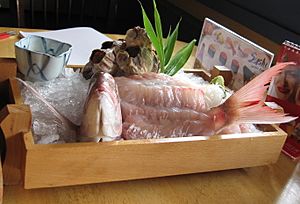
Islamic law, Jewish law, and some Christian laws forbid eating any part cut from a live animal. Judaism applies this rule to land animals and birds. Fish do not need special kosher slaughter, but they must be killed before being eaten.
Examples of eating animals that are still alive include eating "raw oysters on the half shell" and ikizukuri (live fish). Serving sashimi with live animals has been banned in some countries. Practices like Ikizukuri are forbidden in Judaism because they cause unnecessary pain to animals. However, oysters and clams are not classified as animals in Jewish religious law. So, non-Jews may eat them raw.
Primates (Apes, Monkeys, etc.)
Monkey brains is a dish that includes the brain of a monkey or ape. In Western culture, eating monkey brains is often shown as a cruel or strange practice from other cultures.
Monkeys are respected animals in India, partly because of the monkey god Hanuman. Many Hindus are vegetarian and do not eat any meat, including monkeys. Indians who do eat meat also do not kill or eat monkeys. Killing and eating monkeys is taboo and illegal in India.
In Malagasy culture, lemurs are believed to have souls. These souls can get revenge if the lemurs are made fun of or killed cruelly. Because of this, lemurs are part of many taboos, called fady. These fady can be based on stories where a lemur is an ancestor or a helper. Lemurs are also thought to pass on their good or bad qualities to human babies.
Between 1983 and 2002, the number of western gorillas and common chimpanzees in Gabon dropped by 56%. This was mainly because of hunting for meat, made easier by roads built for logging.
Offal
Offal refers to the internal organs of animals, and sometimes parts like the head and feet. Offal is a traditional part of many European and Asian cuisines. Examples include steak and kidney pie in the United Kingdom or Haggis in Scotland. In northeast Brazil, there is a similar dish called "buchada" made with goat stomach.
In the U.S., most organ meats are regional or ethnic specialties. For example, tripe is eaten as menudo by Latinos.
In some areas, like the European Union, brains and other organs that can spread "mad cow disease" are now banned from the food chain.
Some ancient cheesemaking methods used animal stomachs (which contain rennet) to turn milk into cheese. This process could be seen as taboo by strict vegetarians. Newer ways to make cheese use artificial rennet. This means that for strict vegetarians, the way cheese is made can decide if it is allowed or forbidden.
Pigs/Pork
Pork is the most widely eaten meat in the world. However, eating pigs is forbidden in Islam, Judaism, and some Christian groups, like Seventh-day Adventists. This rule is written in their holy books, such as the Quran and Leviticus. Pigs were also taboo in other ancient Middle Eastern cultures, like the Phoenicians and Egyptians. Sometimes, the taboo meant people could not even touch or look at pigs.
The reason for this taboo is debated. Some believe it's because pigs are unclean. In the 19th century, some thought it was due to a parasite called trichina. But this idea is not popular now. Others suggest that pigs were once sacred animals, and the taboo came from that.
More recently, Marvin Harris suggested that pigs are not good for the environment and economy of the Middle East. For example, pigs need more water than other animals to stay cool in dry climates. They also compete with humans for food like grains. So, raising pigs was seen as wasteful. Another idea is that pigs are omnivorous and eat both meat and plants. This makes them different from most other farm animals that only eat plants. Mary Douglas suggested that in Judaism, pigs are taboo for three reasons: they have split hooves but don't chew cud, they eat dead animals, and non-Israelites ate them.
Most Lebanese Christians also do not eat pork, even though their religion allows it. This is because their ancestors, the Phoenicians, thought pigs were dirty.
Poppy Seed
Poppy seeds are used in many foods. In Singapore, poppy seeds are called "prohibited goods" by the Central Narcotics Bureau.
Rabbit
The Bible (in the book of Leviticus) says the rabbit is unclean. This is because it does not have a split hoof, even though it does chew and re-eat partially digested food. Eating rabbit is allowed in Sunni Islam and is popular in several Muslim countries like Egypt. However, it is forbidden in the Ja'fari law of Twelver Shia Islam.
Rats and Mice
In most Western cultures, rats and mice are seen as unclean vermin or pets. So, they are not fit for human food. They were traditionally thought to carry diseases like the plague.
In Ghana, a rodent called "Akrantie" or "Grasscutter" is a common food. This animal is actually a Greater Cane Rat, not a true rat. In 2003, the U.S. stopped importing this and other rodents from Africa. This was because of an outbreak of monkeypox, an illness never seen before in the Western Hemisphere.
Eating any kind of rodent or anything made from rodents is forbidden in Judaism and Islam.
Reptiles
Islam strictly forbids eating reptiles like crocodiles and snakes. Eating reptiles is also forbidden in Judaism. In other cultures, foods like alligator are special dishes. These animals are even raised on farms.
Vegetables, Fruits, and Spices
In some forms of Jainism, Buddhism, and Hinduism, eating vegetables from the onion family is restricted. Followers believe these foods can cause harmful feelings. Many Hindus avoid onion and garlic during festivals or holy months. However, avoiding onion and garlic is not as common as avoiding non-vegetarian foods among Hindus.
Kashmiri Brahmins forbid "strong flavored" foods. This includes garlic, onion, and spices like black pepper and chili pepper. They believe strong flavors can stir up basic emotions.
Jains not only avoid meat but also do not eat root vegetables (like carrots, potatoes, radishes). This is because digging them up kills the whole plant, and Jains believe in ahimsa (non-violence).
Chinese Buddhist cuisine traditionally forbids garlic, a type of Chinese onion, asafoetida, shallot, and victory onion.
In Yazidism, eating lettuce and butter beans is taboo.
The followers of Pythagoras were vegetarians. They also did not eat beans. The reason is not clear. It might have been because beans cause flatulence, or to protect against a disease called favism. Most likely, it was for religious reasons. One story says Pythagoras died because he refused to run through a fava bean field to escape his enemies.
Vegetables like broccoli and cauliflower, while not taboo, may be avoided by religious Jews. This is because insects or worms can hide in their many small parts. Similarly, fruits like blackberries and raspberries are sometimes avoided. This is because they cannot be cleaned well enough without damaging the fruit.
The common Egyptian dish mulukhiyah, a soup made from jute leaves, was banned by the Fatimid Caliph Al-Hakim bi-Amr Allah around 1000 CE. The ban also applied to other foods eaten by Sunnis. The ban was lifted after his rule ended. However, the Druze, who respect Al-Hakim, still follow this ban and do not eat mulukhiyah today.
Whales
Sunni Islam allows Muslims to eat whales that have died naturally. There is a famous Sunni hadith that says Prophet Muhammad approved of this. Whale meat is forbidden (haram) in Shia Islam because whales do not have scales. In much of the world, whale meat is not eaten because whales are endangered. In some countries, like the United Kingdom, it is illegal to bring whale meat into the country.
Forbidden Drinks
Alcohol
Some religions forbid or discourage drinking alcoholic beverages. These include Buddhism, Islam, Jainism, Rastafari movement, Baháʼí Faith, and various Christian groups. Examples are the Baptists, Church of God In Christ, Methodists, the Latter-day Saints, Seventh-day Adventists, and the Iglesia ni Cristo.
Coffee and Tea
"Hot drinks" are taboo for members of The Church of Jesus Christ of Latter-day Saints. This term mainly refers to coffee and tea, not other hot drinks like hot cocoa. The Word of Wisdom, a health code for church members, lists what is allowed and forbidden. While not banned, some Mormons also avoid caffeine in general, including cola drinks. Members of the Seventh-day Adventist Church also generally avoid caffeinated drinks.
There is a story that around 1600, some Catholics asked Pope Clement VIII to ban coffee, calling it "devil's beverage." After tasting it, the pope supposedly said the drink was "so delicious that it would be a sin to let only misbelievers drink it."
Forbidden Combinations
Kashrut, the Jewish food rules, divide all allowed foods into three groups: meat, dairy, and "neither" (like vegetables, fish, and eggs). A meal or dish cannot have both meat and dairy products. Also, meat and fish cannot be cooked together. Fish and milk should not be mixed, but fish cooked with other dairy products is allowed.
In Italian cuisine, it is generally taboo to serve cheese with seafood. However, there are a few exceptions.
|
See also
 In Spanish: Alimentos tabú para niños
In Spanish: Alimentos tabú para niños
 | Precious Adams |
 | Lauren Anderson |
 | Janet Collins |


